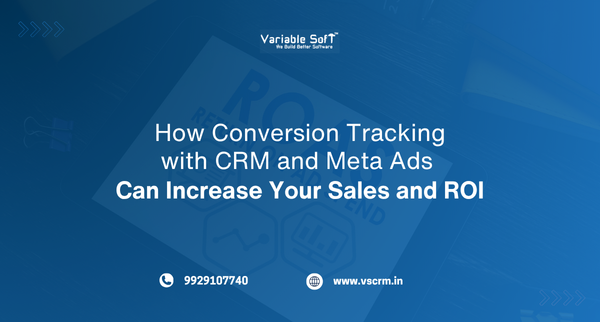
In today’s fast-paced digital world, running ads isn’t enough. Businesses spend thousands on Meta Ads campaigns every month, yet many struggle to understand which efforts actually drive sales. This is where conversion tracking becomes a game-changer.
What is Conversion Tracking?
Conversion tracking is the process of measuring the actions that lead prospects to become customers. These actions—known as conversions—could be completing a purchase, filling out a contact form, downloading a brochure, or signing up for a newsletter.
When linked to a CRM, conversion tracking allows you to see exactly which campaigns, channels, or ads generate revenue. Instead of guessing, you get data-backed insights that inform every marketing and sales decision.
Why Conversion Tracking Matters
- Understand Your Ad Performance:
Not every click turns into a sale. Conversion tracking tells you which ads actually bring paying customers. - Optimize Your Marketing Budget:
Stop wasting money on campaigns that don’t convert. Focus your budget on ads that drive real ROI. - Improve Sales Forecasting:
Knowing which leads convert helps sales teams prioritize high-potential prospects. - Measure Campaign Impact Across Channels:
Track Meta Ads, email campaigns, and website leads in one place for a complete picture of performance.
How Conversion Tracking Improves Sales and Growth
- Faster Decision-Making: Data from conversion tracking shows what works and what doesn’t—allowing you to adjust campaigns in real-time.
- Better Lead Quality: By understanding which ads attract the most valuable leads, your sales team can focus on prospects most likely to convert.
- Higher ROI: Investing in high-performing campaigns means more revenue for every dollar spent on ads.
- Streamlined Sales Process: When CRM data is connected to ad campaigns, sales teams can follow up faster and smarter, reducing lost opportunities.
How to Use Conversion Tracking Effectively
- Set Clear Conversion Goals: Define what counts as a conversion—form submissions, purchases, demo requests, or downloads.
- Integrate Ads with Your CRM: Connect Meta Ads to your CRM so every lead is captured and tracked.
- Use Tags and Tracking Pixels: Add tracking pixels to landing pages to follow user actions accurately.
- Analyze and Optimize: Regularly review which campaigns, ads, and audiences produce the best results. Adjust targeting, creatives, and messaging accordingly.
- Automate Reporting: Use CRM dashboards to see real-time conversions and ROI, making it easier to act quickly.
Conversion tracking isn’t just about measuring clicks or leads—it’s about understanding which actions generate revenue. By connecting your ad campaigns to a CRM, businesses can make smarter marketing decisions, increase sales, and grow efficiently. The insights from conversion tracking transform guesswork into a data-driven growth strategy, maximizing both your sales and your advertising ROI.